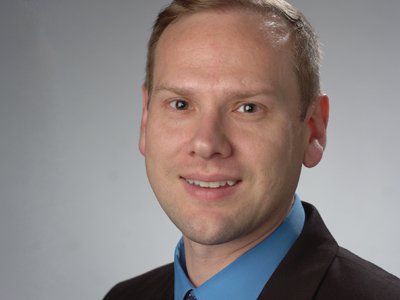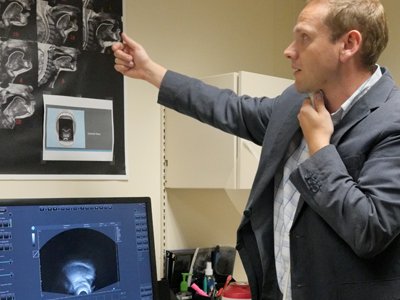Giving Voice to Kids
Gebbie researchers are using an NIH grant to help create new biofeedback therapy models for children battling speech disorders

Jonathan Preston, associate professor of communications sciences and disorders, has received a three-year, $300,000 grant from the National Institutes of Health to test the differences between treatments with, and without, ultrasound biofeedback of the tongue during therapy for school-age children with apraxia of speech. Assistant Teaching Professor of Speech-Language Pathology, Megan Leece, will also assist in the project’s research.
The research endeavor, “Treating Childhood Apraxia of Speech: Role of Biofeedback & Practice Distribution,” is the first federally funded randomized control trial for school-age children who have this type of speech sound disorder.
In apraxia of speech, a child may have difficulty directing their lips, jaw and tongue in a manner to pronounce words correctly, or may distort speech sounds. The disorder makes it hard for children to develop clear, intelligible speech.
“Kids who are not pronouncing sounds correctly, they can be hard to understand, and therefore they are often teased, bullied and picked on because their speech isn’t quite clear,” explains Preston. “Such impairments may lead to social, academic and vocational limitations if not treated and corrected”.

Preston’s team at the Syracuse University Speech Production Research Lab is currently testing is whether ultrasound visual feedback of the tongue during speech can be helpful to children who are learning to pronounce speech sounds. By holding an ultrasound wand beneath the chin, the child and the speech-language pathologist can get an “inside” view as to what is happening during speech. The therapist can then use the visual indicators to help the child understand what they are doing to create word sounds correctly.
“If this is more effective than traditional therapy, which does not include visual feedback during speech, it is hoped this may change the way speech therapy is provided and will result in better treatment outcomes for these children,” Preston continues.
Involvement in the three-year undertaking will also afford several undergraduate and graduate students the opportunity to acquire scientific literacy by being exposed to critical aspects of the scientific process, including research design, behavioral research protocols, blinding, reliability, fidelity monitoring and ethical considerations in research.
A member of the Syracuse University faculty since 2014, Preston was recently honored with the Prize for Excellence in Master’s Level Teaching and delivered this year’s address at the College Arts and Sciences Master’s commencement.
